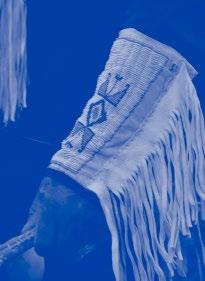
3 minute read
FacultyMember ElevatestheVoice andExperiencesof IndigenousPeople
When Missy Holder was in high school, everything she learned about the history of America’s Indigenous people landed into two main buckets: erroneous accounts of Columbus “discovering” America and the first Thanksgiving.
“There were very few Indigenous students there, and I felt really detached from my culture,” remembers Holder, Ph. D., who is a citizen of the Winnebago Tribe of Nebraska and of the Sac and Fox Nation.
Advertisement
That changed when she attended Haskell Indian Nations University, where she earned her associate in arts degree in social welfare and later worked as an instructor of social work. She earned her bachelor’s, master’s and doctoral degrees from the KU School of Social Welfare, where she is now an assistant professor.

Holder’s experience in high school helped guide her career in social welfare. “How can I help Indigenous students in a public institution feel more welcome?” she wonders now. “In what ways can we help connect them to their culture?”
Holder is working to ensure future generations of Indigenous and non-Indigenous students alike learn the stories, experiences, contributions and accomplishments of Indigenous people, in narratives they tell themselves. She’s starting with the social welfare students in her classes.
“This may be the first time a lot of these students have heard some of the statistics, or gained an overall understanding of the impact of colonization, which lead to historical trauma, which lead to the resiliency that our tribal nations are trying to implement in their communities,” she says.
Through her scholarship, Holder also wants to contribute to the body of academic literature in social welfare that is focused on Indigenous people. “When I was teaching social work classes at Haskell, we did not have a lot of materials written by Indigenous authors or Indigenous social workers,” she explains. “How can I make a difference and contribute to the literature?”
Her current research was influenced by her own experience growing up in a household where she witnessed intimate partner violence and alcoholism. “I feel like people who go into social welfare, there is something that impacted them early in life,” she explains. “That was my primary reason for wanting to help in some way, for individuals or children who were experiencing the same thing I did.”
The findings of her study, “Historical Trauma and the Impact on IPV among Indigenous Women,” focus on the impact of historical trauma on the rates of intimate partner violence (IPV) among Indigenous women, who are 1.2 times more likely than non-Indigenous women to experience violence. As part of her research, Holder interviewed Indigenous women advocates who worked with Indigenous women clients who had experienced IPV. She found that historical trauma caused by colonization helped shape these women’s experiences of and reaction to IPV.
As a result of her work, Holder believes that social workers will be better able to understand the root cause of the trauma that led to modern-day problems with IPV. Equipped with this understanding, social workers will then be able to use a culturally tailored practice when working with Indigenous clients and influencing policy.
“When I think about my work – my research and teaching – I hope it provides a clear path for Indigenous people in general but specifically for social workers, because they will be going back into our communities and working with our people,” she says. “If we are able to label how we got to where we are today, that will help us in terms of healing our communities.”
Event Honors Missing and Murdered Indigenous Women
Indigenous women face murder rates more than 10 times the national average, and four out of five experience some form of violence in their lifetime, according to the Coalition to Stop Violence Against Native Women. KU School of Social Welfare faculty members Missy Holder and Laurie Ramirez are working to raise awareness about the plight of Indigenous women and mobilize people to work for change.
Holder, Ph.D., assistant professor, and Ramirez, MSW, associate professor of practice and the school’s liaison to Native communities, hosted a communitywide event focused on the issue of missing and murdered Indigenous women. Holder is a citizen of the Winnebago Tribe of Nebraska and of the Sac and Fox Nation, and Ramirez is a citizen of Turtle Mountain, Band of Chippewas.
The weeklong event in April and May 2022 included an Actions for Justice kickoff, a walk to honor victims and an awarenessraising social media campaign. It pulled together a wide group of partners, including the Lawrence, Kans., chapter of MMIWG2ST.
“The Actions for Justice week brought attention to atrocities against Indigenous people, from being abducted and murdered, to not receiving legal justice,” Holder says. “The committee will continue to support the Lawrence MMIWG2ST Chapter because the work does not end with an awareness week.”








